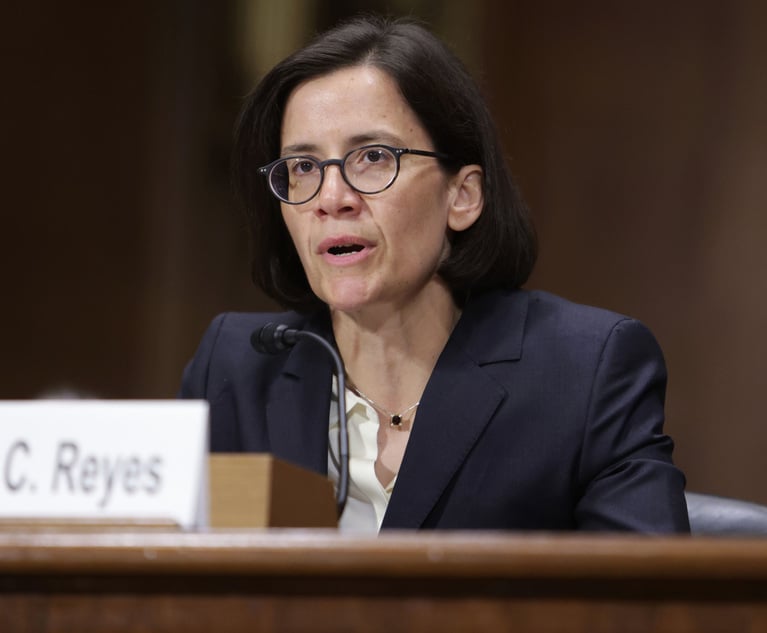Fourth Circuit Rejects Appeal of Decision Nixing Table-Saw Antitrust Claims
The Fourth Circuit held that Oregon-based saw-maker SawStop's allegations that the companies had colluded to boycott its patented injury-prevention technology were barred by the four-year statute of limitations for antitrust claims.
April 23, 2018 at 05:07 PM
5 minute read
 Photo: Jevanto Productions/Shutterstock.com
Photo: Jevanto Productions/Shutterstock.com A federal appeals court has upheld the dismissal of antitrust claims against Black & Decker Inc. and a group of industry-leading table-saw manufacturers, finding that the lawsuit was filed more than a decade too late.
The U.S. Court of Appeals for the Fourth Circuit on April 19 held that Oregon-based saw-maker SawStop's allegations that the companies had colluded to boycott its patented injury-prevention technology were barred by the four-year statute of limitations for antitrust claims.
According to the three-judge panel, SawStop's co-founders knew about the supposed scheme as early as 2002, but decided to take no legal action until 2014, opting instead to “prosecute its collusion case in the court of public opinion.”
The ruling came on SawStop's appeal of a decision by the U.S. District Court for the Eastern District of Virginia rejecting SawStop's argument that Black & Decker, Robert Bosch Tool Corp. and Milwaukee Electric Tool Corp. had conspired with other firms to fraudulently conceal an alleged agreement to to keep SawStop's technology off the market.
SawStop and co-founders Stephen Gass and David Fanning had argued that the delay should be excused because they hadn't found sufficient evidence of collusion until 2010, when David Peot, a former engineer for competitor Ryobi Technologies Inc., testified in a separate case about a secret meeting to make good on a promise to “get together and squish” SawStop, while the company tried to make its technology the industry standard for safety.
However, the Fourth Circuit found that SawStop had actual notice of its claims when the competitors suddenly broke off licensing negotiations in 2002 and instead pursued a joint venture to develop technology that would rival SawStop's invention. The full picture, the judges said, should have come into focus no later than December 2003, when the U.S. Department of Justice's Antitrust Division published a notice alerting the public to the planned alliance.
Still, SawStop declined to even investigate the alleged boycott at the time, even as Gass launched his own campaign against the saw manufacturers, directly accusing them in public and private of collusion.
“In short, SawStop was on both actual and inquiry notice of its claim well before Peot's 2010 testimony. And, once on notice of its claim, SawStop failed to act with reasonable diligence,” Judge G. Steven Agee wrote in a 34-page opinion.
He was joined by Judges J. Harvie Wilkinson III and James A. Wynn Jr. on the panel.
In its briefing, SawStop cited the same court's earlier ruling in the case, which allowed the boycott claim to proceed but upheld the dismissal of two other counts stemming from the supposed anti-competitive conduct. That decision, however, did not address the statute of limitations for SawStop's antitrust claims.
The company had argued that, should the judges find the case time-barred, it would create a “perverse Catch-22,” where antitrust plaintiffs ”must either sue before knowing facts sufficient to state a valid claim (resulting in dismissal), or else wait to amass facts sufficient to state a valid claim, only to be barred by the statute of limitations (again resulting in dismissal).”
Agee, however, said SawStop's position tried to “obfuscate” the court's previous opinion by adding a new requirement onto the traditional terms of fraudulent concealment.
“To be sure, the case presented by SawStop in its complaint shows that Peot's testimony was the first time SawStop learned certain specific information about the table saw manufacturers' alleged collusion,” he wrote. “But that fact has no legal significance in the case now before us as this appeal arises in a different context, on a different issue, with a different standard of review, and with an actual evidentiary record.”
An attorney for SawStop did not return a call on Monday seeking comment on the ruling, and Fanning, the company's vice president, did not respond to a request for comment.
SawStop was represented by Derek L. Shaffer, Paul F. Brinkman, Ethan C. Glass and Jonathan G. Cooper of Quinn Emanuel Urquhart & Sullivan in Washington, D.C.
Attorneys for the table-saw manufacturers were not immediately available to comment. Black & Decker was represented by John David Harkrider from Axinn, Veltrop & Harkrider's New York office. The company was also represented by Ted Mathias, John Tanski, Brooke Oppenheimer and Patricia Carreiro in the firm's Connecticut office; Rick Dagen and Michael O'Mara in Washington, D.C.; and Felix Gilman, also in New York.
Black & Decker's co-defendants included Bosch, represented by Houston- and Washington, D.C.-based Layne Kruse of Norton Rose Fulbright, and Ryobi, represented by Jim Kress of Baker Botts in Washington and Milwaukee, Wisconsin-based Scott Hansen of Reinhart Boerner Van Deuren.
The case, on appeal, was captioned SD3 II v. Black & Decker.
This content has been archived. It is available through our partners, LexisNexis® and Bloomberg Law.
To view this content, please continue to their sites.
Not a Lexis Subscriber?
Subscribe Now
Not a Bloomberg Law Subscriber?
Subscribe Now
NOT FOR REPRINT
© 2025 ALM Global, LLC, All Rights Reserved. Request academic re-use from www.copyright.com. All other uses, submit a request to [email protected]. For more information visit Asset & Logo Licensing.
You Might Like
View All
Justice 'Weaponization Working Group' Will Examine Officials Who Investigated Trump, US AG Bondi Says

Lawyers Across Political Spectrum Launch Public Interest Team to Litigate Against Antisemitism
4 minute read
Federal Judge Warns of 'Serious Sanctions' on FDIC Over Document Retention
3 minute read
Supreme Court Denies Trump's Request to Pause Pending Environmental Cases
Trending Stories
- 1Coral Gables Attorney Busted for Stalking Lawyer
- 2Trump's DOJ Delays Releasing Jan. 6 FBI Agents List Under Consent Order
- 3Securities Report Says That 2024 Settlements Passed a Total of $5.2B
- 4'Intrusive' Parental Supervision Orders Are Illegal, NY Appeals Court Says
- 5Federal Laws Also Preempt State's Swipe Fee Law on Out-of-State Banks, Judge Rules
Who Got The Work
J. Brugh Lower of Gibbons has entered an appearance for industrial equipment supplier Devco Corporation in a pending trademark infringement lawsuit. The suit, accusing the defendant of selling knock-off Graco products, was filed Dec. 18 in New Jersey District Court by Rivkin Radler on behalf of Graco Inc. and Graco Minnesota. The case, assigned to U.S. District Judge Zahid N. Quraishi, is 3:24-cv-11294, Graco Inc. et al v. Devco Corporation.
Who Got The Work
Rebecca Maller-Stein and Kent A. Yalowitz of Arnold & Porter Kaye Scholer have entered their appearances for Hanaco Venture Capital and its executives, Lior Prosor and David Frankel, in a pending securities lawsuit. The action, filed on Dec. 24 in New York Southern District Court by Zell, Aron & Co. on behalf of Goldeneye Advisors, accuses the defendants of negligently and fraudulently managing the plaintiff's $1 million investment. The case, assigned to U.S. District Judge Vernon S. Broderick, is 1:24-cv-09918, Goldeneye Advisors, LLC v. Hanaco Venture Capital, Ltd. et al.
Who Got The Work
Attorneys from A&O Shearman has stepped in as defense counsel for Toronto-Dominion Bank and other defendants in a pending securities class action. The suit, filed Dec. 11 in New York Southern District Court by Bleichmar Fonti & Auld, accuses the defendants of concealing the bank's 'pervasive' deficiencies in regards to its compliance with the Bank Secrecy Act and the quality of its anti-money laundering controls. The case, assigned to U.S. District Judge Arun Subramanian, is 1:24-cv-09445, Gonzalez v. The Toronto-Dominion Bank et al.
Who Got The Work
Crown Castle International, a Pennsylvania company providing shared communications infrastructure, has turned to Luke D. Wolf of Gordon Rees Scully Mansukhani to fend off a pending breach-of-contract lawsuit. The court action, filed Nov. 25 in Michigan Eastern District Court by Hooper Hathaway PC on behalf of The Town Residences LLC, accuses Crown Castle of failing to transfer approximately $30,000 in utility payments from T-Mobile in breach of a roof-top lease and assignment agreement. The case, assigned to U.S. District Judge Susan K. Declercq, is 2:24-cv-13131, The Town Residences LLC v. T-Mobile US, Inc. et al.
Who Got The Work
Wilfred P. Coronato and Daniel M. Schwartz of McCarter & English have stepped in as defense counsel to Electrolux Home Products Inc. in a pending product liability lawsuit. The court action, filed Nov. 26 in New York Eastern District Court by Poulos Lopiccolo PC and Nagel Rice LLP on behalf of David Stern, alleges that the defendant's refrigerators’ drawers and shelving repeatedly break and fall apart within months after purchase. The case, assigned to U.S. District Judge Joan M. Azrack, is 2:24-cv-08204, Stern v. Electrolux Home Products, Inc.
Featured Firms
Law Offices of Gary Martin Hays & Associates, P.C.
(470) 294-1674
Law Offices of Mark E. Salomone
(857) 444-6468
Smith & Hassler
(713) 739-1250








